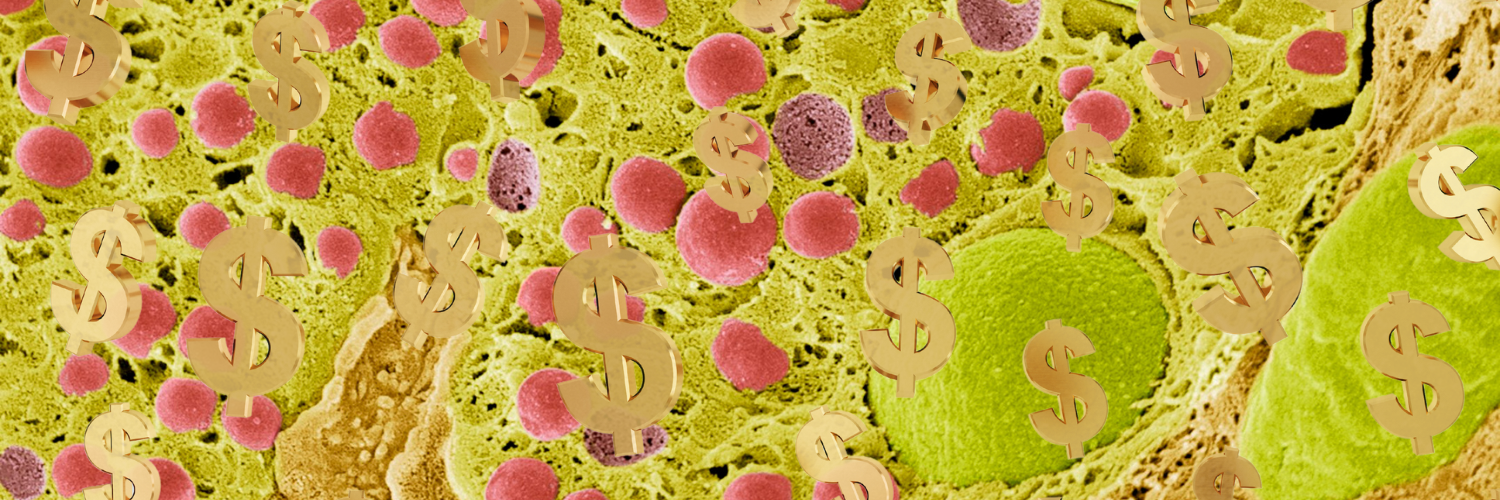The Peculiar Case (and Cost) of Creon

Before there was FDA-approved Creon (pancrelipase), an expensive combination of pancreatic enzymes that require a prescription, there were over-the-counter (OTC) treatments for the same condition, exocrine pancreatic insufficiency (EPI). In fact, the basic pharmaceutical treatment behind Creon has been around for over 100 years. It’s such a long story, but let’s just go back about 30 years.
First, what does Creon do? Creon treats exocrine pancreatic insufficiency (EPI).
Quoting the prestigious Cleveland Clinic: “Pancreatitis, cystic fibrosis and other conditions that affect the pancreas cause exocrine pancreatic insufficiency (EPI). People with EPI don’t have enough pancreatic (digestive) enzymes to break down foods and absorb nutrients. It can lead to malnutrition. Pancreatic enzyme replacement therapy (PERT) can help.” (Emphases added).
Creon is a kind of PERT. As explained below, it comes in many different strengths and is generally wickedly expensive in the U.S. A common dose of Creon is three tablets a day. According to GoodRx, the average retail price for 90 tablets is $1,195.54. That means for cash-paying patients, the annual cost of this drug would be $14,346.48.
History of Creon and OTC Pancreatic Enzymes
In 1995, as part of its large review of OTC products, the FDA issued a final rule in which it determined that pancreatic enzymes sold over the counter were “not generally recognized as safe and effective.” The FDA decided they should be classified as “new drugs.” When products are classified as “new drugs,” companies that wish to market them must apply to the FDA with a New Drug Application (NDA) through which the drug will be evaluated for safety and efficacy. Through the NDA, the FDA determined that for patients to take pancreatic enzymes, they would need to obtain a prescription.
While some people take non-prescription, pancreatic enzyme supplements, experts urge that EPI requires prescription treatments. According to WebMD, “ [people] use supplement products to help with digestion and for other conditions, but there is no good scientific evidence to support these uses.” According to Deborah Gerszberg, RD, CNSC, CDN, Clinical Nutritionist at The Pancreas Center, “if you need to take pancreatic enzymes, you should only take those prescribed by your doctor.”
The Necessity – and therefore high price tag – of Creon
Creon contains three pancreatic enzymes: lipase, amylase, and protease. The right combination and dose of these pancreatic enzymes are considered safe and effective for the treatment of EPI.
And, it turns out, a lot of people suffer from EPI and therefore need pancreatic enzymes to stay alive. I was surprised to learn of Creon’s relative popularity in that it ranked 262 out of the top 300 of most prescribed drugs in the U.S. in 2020, having been dispensed to 282,382 patients that year. Being a high-demand and essential medication means whatever drug companies charge for Creon in the U.S., they can often get.
The personal story of Rebecca Taylor exemplifies what’s going on here with Creon:
The other day, my mom and I were at a meeting with one of my GI doctors [gastroenterologists], when he pulled us aside to introduce us to a pharmaceutical representative. After our short conversation, we held in our hands a card that would have saved us approximately $113,100 in medical expenses over the course of my life.”
Even at PharmacyChecker, where we report on and bring transparency to prescription drug prices, we are impressed (and downright happy) to hear the figure of $113,100 in savings.
On the other hand, the hero in Rebecca’s story is a pharmaceutical representative and that gives me pause.
Marketing Tactics Disguised as Patient Saviors
The card responsible for “saving” all that money is sponsored by AbbVie Inc., the same drug company authorized by the FDA to sell Creon, and it is part of a marketing scheme common to many brand-name pharmaceutical companies. Pharmacy benefit managers (PBMs), albeit culprits in their own right in keeping drug prices high, do cut to the chase when it comes to attacking these drug manufacturer savings cards:
Copay coupons, at their core, are a marketing tool. Drug manufacturers use them to steer insured patients toward their medication. This may circumvent plan sponsors' formulary strategy, as the presence of a copay card means patients may not have financial incentive to utilize a lower-cost preferred therapy.”
As marketing tools, coupons are extremely effective. One study found that for every $1 million invested in coupons, pharmaceutical manufacturers realized more than $20 million in profits.”
Poor PBMs. Why are they so sad?
Because when drug companies pay for the co-payments of insured patients, the PBMs must pay for the real cost of the drug. Rebecca continues her story by saying: “Now with my new card in hand, our new monthly cost of CREON drops from $3,200 to $5. You read that correctly, because of my new card, the cost of CREON has been lowered by $3,195 per month!” While I’m happy for Rebecca, she’s wrong about the “cost of Creon.” The cost is still $3,200, but the PBM is responsible for $3,195 and Rebecca for the remaining 5 bucks.
In the case of the most immediate relief for patients trying to afford their medications, I’m cool with Big Pharma copay cards. On the other hand, these costs are passed on to the insured in the form of higher premiums and deductibles. If you need Creon, are insured, and are eligible, then you might be able to get Rebecca’s deal by applying for a Creon co-pay card. Go for it.
International Creon Strength Complexity
In many cases, the same drug company – or its subsidiaries – distributes the same drug with the same strengths in different countries throughout the world. For example, drug company Merck or its subsidiaries market Januvia 100 mg in the European Union, India, the United States, and the United Kingdom.
In other cases, different drug companies entirely are authorized to commercially distribute the same drug. For the drug Daraprim 25 mg, GlaxoSmithKline holds the marketing authorization in the UK; Vyera Pharmaceuticals in the United States.
Sometimes drug companies sell the same drug with different strengths in different countries. This is the case with Creon.
In 2009, Solvay Pharmaceuticals received FDA approval to market Creon in the United States. That same year Abbott Pharmaceuticals acquired Solvay. In 2013, a new drug company, AbbVie, spun off of Abbott. AbbVie holds the marketing authorization for Creon in the U.S., but Abbott holds the marketing authorization for Creon in several other countries. Drug company Mylan sells Creon in the United Kingdom and in Canada. Yeah, it’s confusing.
In the U.S., Creon (pancrelipase) is sold as delayed-release capsules, at the following strengths of its ingredients lipase, protease and amylase, respectively: 3000/9500/1500, 6000/19000/30000, 12000/38000/60000, 24000/76000/120000, and 36000/114000/180000.
In Canada, Creon is sold in the following formulations, at the following strengths of its ingredients lipase, protease and amylase, respectively: Minimicrospheres Micro, granules (5,000 Ph. Eur. units / 5,100 Ph. Eur. units / 320 Ph. Eur. units). A larger segment of capsule products are identified as follows with their corresponding strengths: Minimicrospheres 10 (10,000 Ph. Eur. units / 11,200 Ph. Eur. units / 730 Ph. Eur. units), 20 (20,000 Ph. Eur. units / 22,400 Ph. Eur. units / 1,460 Ph. Eur. units), 25 (25,000 Ph. Eur. units / 25,500 Ph. Eur. units / 1,600 Ph. Eur. units), and 35 (35,000 Ph. Eur. units / 35,700 Ph. Eur. units / 2,240 Ph. Eur. Units).
In the United Kingdom, “Creon is available in different strengths; 25,000, 10,000 and Creon Micro (5,000).”
Ordering Creon Internationally
If you cannot afford Creon in the U.S. and you are seeking to obtain it in Canada, the UK, or elsewhere, the different strengths make things harder. For one, your prescription will only list the FDA-approved strengths noted above. Additionally, it is not clear which “foreign” Creon strength you would benefit from. That’s why you should check with your healthcare provider first.
In the U.S., according to GoodRx, the average price of 90 capsules of 12000 units of Creon is $388.18.
According to PharmacyChecker, one PharmacyChecker-accredited Canadian online pharmacy sells 100 capsules of Creon Minimicrospheres 25000 for $99.99.
To add further confusion, the Mayo Clinic’s website states that there are several brand names for pancrelipase besides Creon including Palcaps, Pancreaze, Pancrelipase, Pangestyme EC, Panocaps, Pertzye, Ultracaps, Ultresa, Viokace, and Zenpep. Mayo lists Viokase as a Canadian brand name.
For pancrelipase marketed under the name Viokace (with a “c”), the U.S. and Canadian strengths are aligned for some products.
For Viokace 10440 units, GoodRx.com’s average U.S. price is $389.14 for 90 tablets.
On PharmacyChecker, one PharmacyChecker-accredited Canadian online pharmacy lists 100 tablets for $63.50.
Last Words
Some people suffering from EPI will die without taking pancreatic enzyme treatments. If they can’t afford it in the United States, more affordable international online pharmacy options could save their lives. Due to the peculiar differences and complexities in the strengths and dosage of treatments like Creon, it is important to work with a licensed provider to get the prescription you need. Bringing details, such as the strength differences of the products you are interested in, to your provider will empower them to help you with your prescription.




